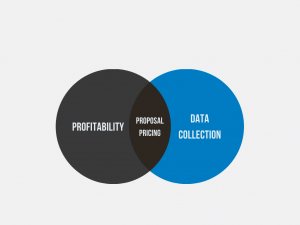The Data Driven Paradigm
There has been a sweeping shift in business towards being data driven, an idea that has been met with surprising opposition from salespeople across the board.
Because of advances in software technologies, tracking a salesperson’s activities and generating data sets related to the sales process has been a popular method of employing this mindset. In concept, salespeople should be amongst the demographics that benefit most from this data set. Used properly, they can reference their interactions to build better client relationships, reference trends to detect what approaches they should take, and more.
However, we recently viewed this video from Brian G Burns on LinkedIn that confirms salespeople’s frustrations. From their perspective, entering activities and logging every myopic detail of an interaction with a client takes more time than it is worth.
Why do it then? Managers and analysts who want to look at the company performance from a “big picture” point of view, more readily see the value of being data driven than their sales force. From their perspective, an incomplete data set means that the reporting is inherently incomplete, making it useless for forecasting and decision-making purposes. They rely on the “boots on the ground,” their salespeople, to generate quality data sets.
The opinion we observed in the LinkedIn video encouraged stepping back from the data driven mindset and instead focusing on being revenue driven, allocating time to the activities that bring more money into the company rather than those that generate the most data.
As a software provider, we at SalesChain were provoked to ask: Just because technology has made data-generating tools available, should they be mandated, or are they wasting valuable employee time? In thinking about this, we determined that the shift towards being data driven is only problematic when attention is taken away from the tools and actions that put money on the table. Time SHOULD be spent on building data that is relevant to generating revenue.
Should You Focus on Revenue or Data?
Both. We find that a lot of people see these as contrary mindsets where instead we see revenue as being a focal point for data. In other words: we need to be revenue driven in the way we manage our data. Businesses have been using data to understand their finances as far back as the Egyptians, who gave us the first written number system. With modern technology, we’ve been blessed with the ability to track data at an enterprise scale with the click of a button. Business Intelligence tools and reporting put the big picture in the big data that helps most modern companies grow. Using tools that gather data on every deal in a central location is essential for forecasting and financial reporting.
But technology alone should not drive decision-making. People make decisions by making wise use of all the resources and tools available to them. New digital sales tools are powerful and effective if a company can focus on data that is important to its growth.
The challenge for businesses: How will you know what data to focus on? How do they justify a type of activity tracking as being directly correlated with revenue? A salesperson may not need to write down every phone call, but they should write down pieces of information that are relevant to the deal that they are working on. These are the valuable pieces of information that should make it from the mouth of the customer on a call, to the notes section of your CRM.
The critical challenge for managers is clear communication and consistency in their leadership. Managers must make sure they define what information is important and enforce the use of the software solution in a manner that helps them collect this data. If they spread their focus too thin across too many goals or too many data points, salespeople will get overwhelmed or feel like they’re wasting their time and will never adapt to using the system.
When implemented with purpose, seasoned salespeople will realize that a business automation solution, when used effectively, will save them valuable time, and help them to get more proposals out to potential customers. Spoiler alert: Getting more proposals to customers and driving more revenue in with measurable results will be the key to this whole puzzle.
What Data Actually Helps Drive Revenue?
According to SalesChain president Tim Szczygiel, “Management is often focusing on the wrong data. I don’t think that data is wrong, just that the focus is wrong. The most important data is that which is derived from proposal and order pricing processes. This data needs to be complete and accurate so that the business can leverage this data to maximize their revenue and the value that they get out of their data set.”

If we picture a Venn diagram to compare components of an automation system that are important for both management and salespeople, proposal pricing tools will undoubtedly fall in the middle.
Amongst the most important management reports is the financial comparison of how much revenue is being forecast, how much revenue is being closed, and how much revenue was in each salesperson’s quota. Effectiveness of promotions, profitability vs revenue, and the use of certain service pricing methods are other examples of good Key Performance Indicators (KPI’s) to track.
SalesChain Case Study
Pricing Proposals and Paying Commissions Faster with John Kerling of United Business Systems
How Do You Generate MORE Relevant Data?
No trick answers here. If the best revenue-driven data is coming from the proposal and order process, the way to generate more useful data is to price more proposals. Getting more proposals in front of customers gives management a larger dataset to reference and has the added benefit of winning more deals.
With this in mind, the salespeople make a valid point that tracking CRM minutia is not the most important way they can spend their time. The activity tracking component of your CRM software is secondary and can easily be used on a case-by-case basis to supplement the revenue-driver – the proposal pricing tool.
Once you begin to look at the data related to proposals priced to understand the trends and use that information to adapt your sales towards the trends that work, you are successfully doing data driven work with a revenue driven purview.
Keep Your Focus on The Dollars
While tracking activities is valuable, especially when you are first growing a business, it is easy to fake success in a CRM. Simply making a certain number of deals or sending a certain number of emails will only get a sales organization so far. If you are crushing your numbers every month as a salesperson, no one is going to care about the method that you employ. That includes, to a reasonable extent, your participation in the company’s CRM.
From a revenue driven mindset, SalesChain recognizes that a keystone of our software suite is our proposal pricing tool. Pricing more proposals and getting more offers in front of your customers is what is going to drive more revenue through your doors.
When you become a platinum customer with SalesChain, it is all about the revenue. When you start pricing, managing, and updating the proposals that you present to prospects, your company’s forecast takes care of itself. Your superiors are not really going to care that much about how many activities you have logged if you propose 100 deals and close 10 of them every month.
We agree with everything Brian (from the video) has to say. Focusing your attention on revenue is a fundamentally good business practice. If you have the right mindset and understanding, you can employ powerful tools to help you do so with data in mind.
This article was a team effort led by Matthew Szczygiel. Special thanks to Contributing authors Jennifer Boucher, Mary Ellen Hogan and Tim Szczygiel.
